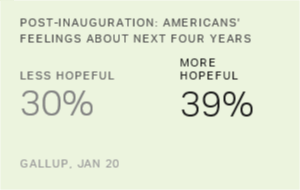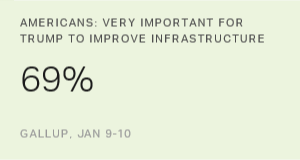Donald Trump's inaugural address Friday gives us an important window into his presidential thinking, and how that thinking fits with American public opinion. He labeled the situation for Americans as "carnage" and detailed a ravaged America. But Gallup's data show that Americans are actually pretty satisfied with their personal lives in general and that more are thriving than were eight years ago. Americans' views of the economy are also becoming more positive, in part because of Trump himself.
When asked to name the most important problem facing the nation, Americans spread their responses across a wide variety of issues, none dominant -- historically a sign of good times rather than bad. And a rare situation for a president taking office for the first time.
We don't find a distressed public such as in 1933 as Franklin Roosevelt took office during the Great Depression. And we don't find a public focused on one major problem or concern, as was the case for Richard Nixon in 1969 (Vietnam), Ronald Reagan in 1981 (inflation) and Bill Clinton in 1993 (economy). In fact, on most measures, today we find a public that personally and economically reports being much better off than in January 2009 when Barack Obama took office.
Trump also does not resonate with majority public opinion on a number of his most visible policy and issue positions. These include building a wall along the border with Mexico, deporting immigrants living in this country illegally, lowering taxes for the wealthy and favoring fossil fuel production over the environment.
Where Trump does sync more directly with public opinion is in his direct attack on the federal government itself. This coincides with one of the major public opinion trends of our time -- the loss of confidence that Americans have in the men and women who represent them in Washington. Despite an uptick last fall, the government is in terrible shape according to the American people.
And it is not just the government. Confidence in institutions as a group is down as well. This includes another frequent Trump target, the mass media.
This is important because institutions -- organized patterns or ways of performing vital societal functions -- are viewed from a sociological perspective as a core element of society. As Americans lose confidence in those, they lose confidence in the broader fabric of society.
Americans also are riding a trend toward loosening adherence to traditional norms on a wide variety of values-oriented issues. Norms -- expectations of behavior in specific situations -- help bind a society together, as is the case with social institutions.
Americans are, in short, confronting change in sociological structures and a loss of faith in the major social patterns that define the society. This is not a reflection of personal angst, but rather anger and disappointment at society's larger institutions.
These shifts are, at least in part, most likely responsible for the low overall satisfaction rating we get from Americans when we ask them to rate how things are going in the U.S.
Wittingly or not, Trump's campaign took advantage of these shifts by recognizing the discomfiture they cause many citizens and, at least indirectly, vowing to fix them. Trump rails that the society is broken ("carnage") -- and with the use of "again" in his "Make America Great Again" slogan, calls for a fix in specific institutions and implicitly a return to previous normative standards.
Trump also emphasized an approach that stressed what should be done to keep society as a whole working. A good deal of Hillary Clinton's campaign rhetoric was based on a different approach -- the idea that a long list of segments of society needed special attention, each addressed individually. Trump's approach most likely resonated with Americans who view the country as threatened and see large, big-picture concerns. Again, Trump's slogan wasn't "Make Specific Segments of Society Great Again" but "Make America Great Again."
Now that he is in office, the question is where Trump goes from this point forward.
I noted previously that a number of Trump's specific policies are favored by less than a majority of Americans. This includes, in particular, building a wall between the U.S. and Mexico. And, of course, Trump is very unpopular for a new president, although his initial job approval rating looks like it is going to be higher than his transition approval or his pre-inauguration favorable rating. So he does not have a reservoir of goodwill nor a list of policies that will all meet with majority public opinion.
Thus, Trump would appear to be most in tune with public opinion if he keeps riding the horse that brought him into town. This would include, first and foremost, a focus on government. This is a complex challenge, because it means both assessing what the role of government should be and assessing and improving efficiency in the way that our government operates. Most Americans do not believe the government should be used to rectify all problems, nor do they believe in shutting down whole departments of government (a la Ted Cruz).
Of course, making the government more efficient and making elected representatives more responsible are notable goals very much in tune with American public opinion. And part of the process of figuring out the appropriate role of government is a focus on what to do about taxes and the tax system.
Trump also cannot go wrong in his continuing emphasis on spending federal money to improve the nation's infrastructure. This is rated as the most important of any of Trump's campaign promises, and in 2009 was also among the top-rated promises made by Obama. Proving its universal appeal, Trump's rival, Hillary Clinton, also proposed spending money on infrastructure as part of her platform.



